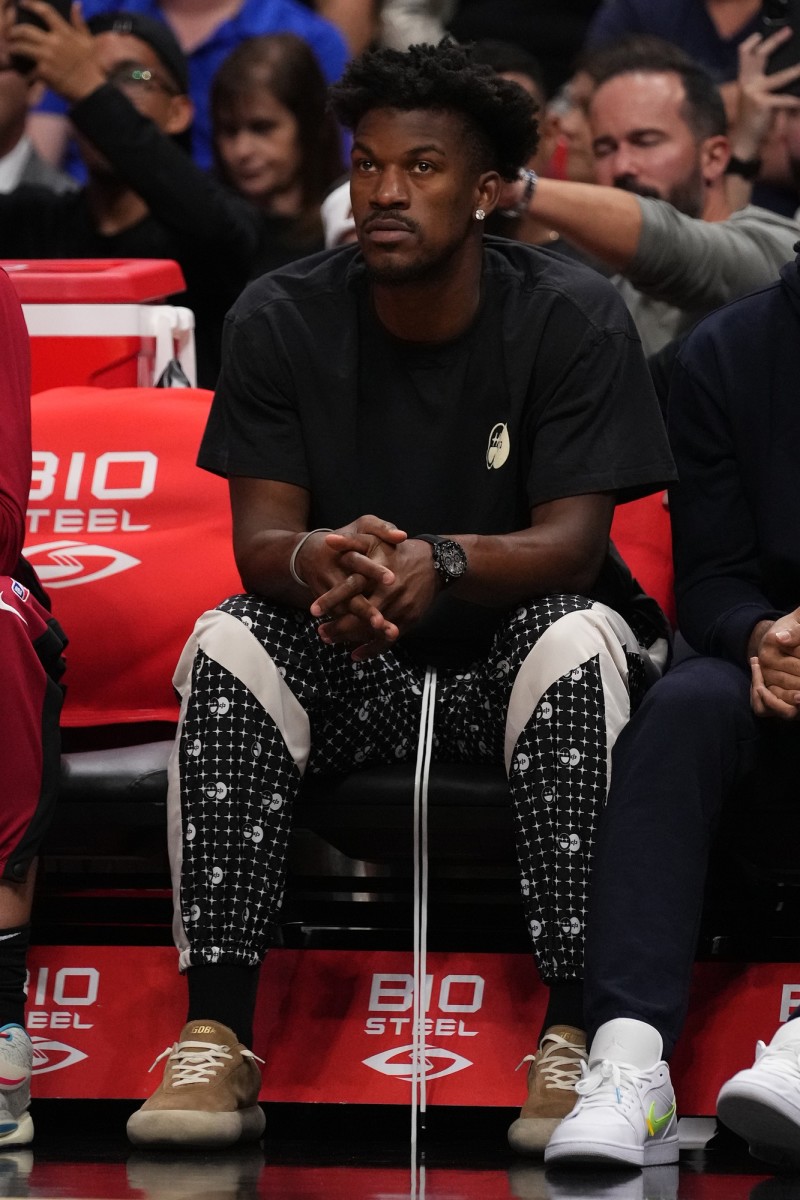Brian Murphy: NBA load management is a load of deceit for fed up fans

Watching impressionable NBA fans meet their mythical hoops heroes and grab swag behind the velvet curtain melts hearts frozen by the cold, calculating hands of load management.
There was 13-year-old Noam Dorfman celebrating his birthday with his father, Lev, at a Cavaliers game in December after the Israelis traveled “5,958 miles just to see Luka” Doncic, according to Noam’s handcrafted sign.
The Dallas Mavericks superstar was out of the lineup because sports science pragmatism dictated Doncic should rest the second half of a back-to-back. Worse for Noam, Doncic wasn’t even in Cleveland that night to see his sign.

Or 12-year-old Felipe of Argentina who chronicled his journey to Miami last month to watch his favorite player, Jimmy Butler, and plug the Heat small forward’s business on a placard:
“Dear Jimmy: We flew over 4,405 miles to see you play. Can we get a photo or a big face coffee?”
Butler was scratched against the Boston Celtics despite not being on the injury report with what the Heat eventually deemed was a bad back.
Naturally, pregame images of the crestfallen youngsters went viral. The Mavericks and Heat respectively performed a full-court PR press to strip the “Kick Me” signs off their backs.
Doncic reached out to the Dorfmans, who are temporarily living in Cincinnati, and invited them to be his special guests when the Mavericks visit Indianapolis in March. Noam’s favorite player also sent a gift package.
Butler, meanwhile, treated Felipe and his older sister, Zoe, to a tour of the Heat locker room, posed for pictures and signed autographs to transform those sad faces into smiles.
Dallas and Miami’s sentiments were genuine. No doubt the introductions and graft were more fulfilling for the lads than plain old tickets to an increasingly watered-down product.
But what about all the Noams and Felipes whose plaintive pleas are not amplified by the social media bullhorn and damage-controlled by chastened teams?
The season-ticket holders and NBA diehards who have invested in a star-driven league only to collect junior varsity dividends?
Or the Joe Six Packs who can only afford to treat their starry-eyed kids to one game a season and deserve truth in advertising when emptying their wallets?
Load management may ensure greater player health for playoff runs while extending careers. But the data-driven, preventative maintenance also is a scourge that guts the NBA’s credibility as it gouges an exploited fan base.
This is Adam Silver’s mess and solely his to clean up. The laissez-faire commissioner has been unwilling to wield his power or influence over front offices that are incentivized to bubble-wrap their rosters while showing nothing but contempt for the audience.
Fining teams retroactively for misleading injury reports or whining publicly about the San Antonio Spurs letting the genie out of the bottle a decade ago is not leadership. Silver is letting the rot fester under the guise of player empowerment and collective bargaining as attendance and television ratings sink.
Never mind the $25,000 fine the league hit the Heat with after the Butler episode for failing to disclose his injury. Or the same paltry sum levied against the Brooklyn Nets for resting eight players – including superstar trio Ben Simmons, Kevin Durant and Kyrie Irving – on the second night of a back-to-back at Indiana.
Quarters in the couch cushions for these gold-plated franchises. Means nothing to fans who pay full freight only to watch stars parade around the sidelines in fashionable street clothes and above-it-all bro-hugs -- if they even bother to show up.
Load management is no longer an annoying concept. All 30 teams have baked it into their player development and roster management. And it makes total sense in the abstract.
Spreading out minutes over the course of a grueling 82-game regular season, including resting players on the second day of consecutive games, limits fatigue and hedges against breakdowns when the stakes are highest in May and June.
General managers and their coaches are paid to win. Following sound medical advice gives them a better opportunity for success, especially when their competitors are doing the same.
But there are greater considerations, like selling a viable product and preventing its corrosion in a fragmented society with plenty of other entertainment options.
It all began in 2012 when Spurs GM R.C. Buford and coach Gregg Popovich routinely rested future hall of famers Tony Parker, Tim Duncan and Manu Ginobili even when they were healthy enough to play.
Then-commissioner David Stern fined the Spurs and scolded the club for doing “a disservice to the league and our fans” when all three sat during a nationally televised game at Miami.
Sure, there are fines for teams who dilute their rosters for games exclusively on TNT, ESPN or ABC. But they are hardly prohibitive. Silver has neither Stern’s spine nor the late executive’s rock-ribbed protection of the NBA brand at heart.
The NBA ascended from its drug-fueled ashes and tape-delayed wilderness of the 1970s into the strongest North American sports league behind the NFL. In the ’80s, Stern marketed individual stars like Magic Johnson, Larry Bird, Charles Barkley and Michael Jordan to put more fannies in seats and eyeballs on screens.
“NBA Action: It’s fantastic!”
All boats rose with the tide as the NBA progressed into the LeBron James era of superstars dictating not only their salaries, but where and for whom they will play – and who they want to play alongside.
Load management is now an anchor, dragging down Stern’s marketing blueprint and the NBA’s one-sided relationship with its fans to the depths of fraud.
Owners will never agree to reduce the number of games, even though the regular season has become one long exhibition schedule teasing the playoffs. Too much revenue to leave on the table.
They could try to limit the number of back-to-back games or three-in-four-nights stretches to build in more rest for players.
However, the NBA and most of its teams do not control their arenas, which are often shared with NHL teams. Or their venue’s calendars, which typically are managed by companies who care more about booking concerts to keep their buildings full than helping basketball players keep their legs fresh.
The least the league and its teams can do is be honest with their customers before they plunk down hundreds of dollars on tickets, parking, food, beverages and souvenirs.
Most sports teams use dynamic pricing, charging more for weekend games or those against premium opponents. I can accept it will cost more to watch Steph Curry and the defending champion Golden State Warriors on a Saturday night than seeing the lowly Detroit Pistons on a Tuesday.
But it was a cold slap in the face to Timberwolves fans who came to the Target Center Feb. 5 against Western Conference-leading Denver only to learn moments before tipoff that the Nuggets had decided to rest four starters, including star center Nikola Jokic.
It’s insulting to blatantly treat fans like lemmings. Fulfill the partnership instead of manipulating it.
It’s time for dynamic un-pricing.
A pro-rated system that devalues tickets when home or visiting teams sit starters for rest, not injury. Guaranteed refunds for the last-minute roster shenanigans that can leave young fans in tears and their parents gnashing their teeth.
You’d probably have better luck boiling the ocean than waiting for teams to give money back. But we can all dream.
Transparency and truth in advertising.
It’s Fantastic.
